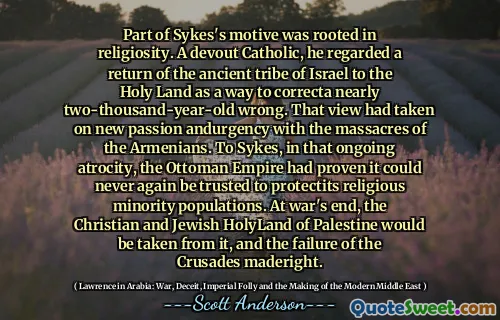
Part of Sykes's motive was rooted in religiosity. A devout Catholic, he regarded a return of the ancient tribe of Israel to the Holy Land as a way to correcta nearly two-thousand-year-old wrong. That view had taken on new passion andurgency with the massacres of the Armenians. To Sykes, in that ongoing atrocity, the Ottoman Empire had proven it could never again be trusted to protectits religious minority populations. At war's end, the Christian and Jewish HolyLand of Palestine would be taken from it, and the failure of the Crusades maderight.
In "Lawrence in Arabia," Scott Anderson explores Sykes's deep religious motivations, shaped by his devout Catholic faith. He believed that the restoration of the ancient Jewish tribes to the Holy Land was a way to rectify centuries of injustice, particularly in light of the Armenian massacres. Sykes perceived this historical moment as a pivotal opportunity to right past wrongs and emphasized the urgent need to act against the Ottoman Empire's failure in protecting its religious minorities.
For Sykes, the war's conclusion was a chance to reclaim the Christian and Jewish heritage of Palestine. He viewed the Ottoman Empire’s actions during the atrocities as confirmation that it could not be relied upon to safeguard its vulnerable populations. This belief propelled his ambitions, as he sought to ensure a favorable outcome for the Holy Land, seeing it as a long-awaited resolution to the failures of the Crusades.











